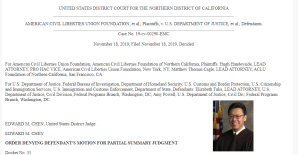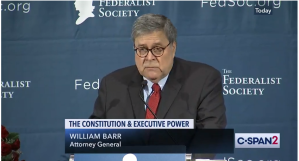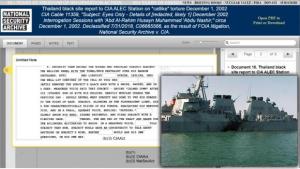Glomar Denial Shot Down in the Courts Again, AG Barr Slams FOIA “Regime” at Federalist Society Event, and More: FRINFORMSUM 11/21/2019
 Glomar Denial Handed Second Loss in the Courts this Month
Glomar Denial Handed Second Loss in the Courts this Month
The District Court for the Northern District of California ruled that the FBI can’t issue a Glomar response to an ACLU FOIA request concerning the bureau’s social media monitoring program. (A “Glomar” response is when an agency refuses to confirm or deny the existence of documents in response to a FOIA request because “the existence or nonexistence of requested records is currently and properly classified.” The tactic has been adopted by several federal agencies and some state and local entities, including the New York Police Department.)
Bloomberg’s Bernie Pazanowski reports that the FBI denied the ACLU’s request for information “about the FBI’s social media related policies and guidance, records concerning the purchase and acquisition of social media surveillance technologies, and records concerning the algorithms and analytics used to operate the program” by citing FOIA exemption 7(E) – which applies to law enforcement techniques and procedures that are “not generally known to the public”, and issued a Glomar response. The FBI argued that confirming or denying such technologies could disclose the bureau’s lack of capability.
Judge Edward Chen ruled, however, that exemption 7(E) “refers only to disclosure of techniques and procedures, and not to the lack of any such technique or procedure.” Judge Chen went on to say “it is well known that many related agencies do engage in social media surveillance in the immigration centers and share that information. This lessens the risk that people will be emboldened by the FBI’s disclosure to spread criminal or terrorist messages through social media. Second, even if the FBI were to disclose it has no records of purchasing or acquiring products or services used to surveil social media, that does not mean that the FBI has no such tools at its disposal, as it could have developed such tools internally.”
This news comes on the heels of Jason Leopold’s significant FOIA win against the CIA’s expansive use of the Glomar exemption. Earlier this month in Leopold’s FOIA suit, the District Court for the District of Columbia ruled that because President Trump tweeted information regarding a defunct covert CIA program to pay and arm Syrian rebels, the CIA could not issue a Glomar in response to Leopold’s FOIA request for information on the terminated program.
 AG Barr Slams FOIA “Regime” at Federalist Society Event
AG Barr Slams FOIA “Regime” at Federalist Society Event
Last Friday Attorney General William Barr delivered remarks at the Federalist Society’s 2019 National Lawyers Convention that included some choice comments about FOIA. Barr’s speech focused primarily on the “steady encroachment on Presidential authority by the other branches of government,” although his speech did not mention that the White House is also exempt from FOIA. Barr says:
“There is no FOIA for Congress or the Courts. Yet Congress has happily created a regime that allows the public to seek whatever documents it wants from the Executive Branch at the same time that individual congressional committees spend their days trying to publicize the Executive’s internal decisional process. That process cannot function properly if it is public, nor is it productive to have our government devoting enormous resources to squabbling about what becomes public and when, rather than doing the work of the people.”
Attorney Mark Zaid (currently part of the legal team representing the intelligence community whistleblower at the heart of the current impeachment investigation) notes, “Not even John Ashcroft, when he was President Bush’s Attorney General, spoke negatively about #FOIA in this manner. Most past AGs have actually favorably embraced statute as positive example of how our country leads world in transparency & democracy.”
 Secret US Intelligence Files Provide History’s Verdict on Argentina’s Dirty War
Secret US Intelligence Files Provide History’s Verdict on Argentina’s Dirty War
Archivist Peter Kornbluh’s most recent article for The Nation discusses the ways the Argentina Declassification Project is already helping human rights efforts in that country, noting that Argentine officials are currently assessing the 47,000 pages of declassified documents for their “evidentiary value in human rights prosecutions.”
The unique value of these documents comes from the “meticulous quality control” of the project’s declassification process. As Kornbluh notes, “When intelligence documents are declassified, they’re usually replete with heavy redactions—swaths of information blacked out in the name of national security or to protect covert ‘sources and methods.’ But because of the meticulous quality control exercised by an unheralded NSC records manager named John Powers, the released CIA, FBI, and Defense Intelligence Agency records on Argentina are far less censored than previous special declassifications. This unique transparency has rendered them far more valuable to historians, as well as to the legal investigators who continue to prosecute these crimes against humanity.”
 Archive FOIA Cable Shows Guantanamo Prosecutors Misleading Defense
Archive FOIA Cable Shows Guantanamo Prosecutors Misleading Defense
A military judge presiding over the Guantanamo trial of alleged USS Cole bomber Abd al Rahim al-Nashiri recently cited a cable released to the National Security Archive as evidence that the system for handling classified CIA evidence at the detention camp’s national security trials is “flawed and unfair to the defense.” The current system allows prosecutors, working with members of the intelligence community, to decide what portions of evidence the defense needs for trial. Prosecutors, as Carol Rosenberg reports for the New York Times, “then redact portions of reports from the C.I.A. black sites or write summaries to substitute for the actual evidence.”
To reach his determination, Judge Col. Lanny J. Acosta Jr. compared a December 1, 2002, cable that was released to the Archive last year in response to a FOIA lawsuit to a version of the same cable prosecutors provided al-Nashiri’s defense attorneys. Judge Acosta found “the comparison undermines any contention the redactions are narrowly tailored to a legitimate need to protect national security.”
Joint Declaration on the Guatemala Police Archive
The Historical Archive of the National Police of Guatemala (AHPN) faces continuing challenges. Following a downsizing in staff and significant budget cuts, the Archive eliminated its investigations unit which, in the past, reviewed records for information to give to families of the disappeared, human rights investigators, scholars, and prosecutors.
Equally troubling is the Guatemalan government’s decision to smear, isolate, and criminalize two people who were central to the creation of the Historical Archive of the National Police and its flourishing. While these events are less dramatic than an outright closure of the AHPN, the Archive is left to operate in a state of suspended animation—its human rights and justice role eliminated, its former directors under criminal threat.
In response, the International and National Advisory Councils of the AHPN have circulated a declaration of concern about the Police Archive’s current situation and the campaign against Anna Carla Ericastilla and Gustavo Meoño. Find them in English and in Spanish here.
The First Nukes on the Korean Peninsula: New Evidence on the Origins of U.S. Deployments 1958-1991
In the late 1950s, Secretary of State John Foster Dulles worried about the hit to America’s global political standing if the U.S. stationed nuclear weapons, some of which were huge, in South Korea, while senior Defense Department officials pointed to the fiscal benefits of these deployments, according to declassified records posted by the National Security Archive. Dulles, who had presided over U.S. nuclear deployments around the world, was cautious, declaring that it would be “disastrous to our position with our Allies and the United Nations” and wondering aloud “why it was essential that we be able to haul these great monsters around,” while DOD and the Budget Bureau insisted there were “substantial economies” to be had.
 TBT Pick – Anatoly Fedorovich Dobrynin (1919-2010)
TBT Pick – Anatoly Fedorovich Dobrynin (1919-2010)
Today’s #TBT pick commemorates the birth of Anatoly Dobrynin 100 years ago this week. Dobrynin, one of the most effective ambassadors of the 20th century, is being remembered in both his home country and the United States for his abilities, not least in helping to manage the ever-turbulent relationship between the two superpowers for almost a generation during a pivotal period of the Cold War. His role in confidential back-channel communications with senior American officials from Robert F. Kennedy during the Cuban missile crisis to Henry Kissinger in the era of détente helped build a basic level of confidence and trust on both sides that was crucial to resolving or averting numerous actual and potential crises.
This updated posting features a small selection of documents and excerpts from three oral history conferences from the mid-1990s that show Dobrynin “in action” – both as a diplomat and as a historian.
Sign Up
Want to stay on top of the latest FOIA news? Click here to sign up for our weekly FRINFORMSUM (Freedom of Information Summary) email newsletter.

Comments are closed.